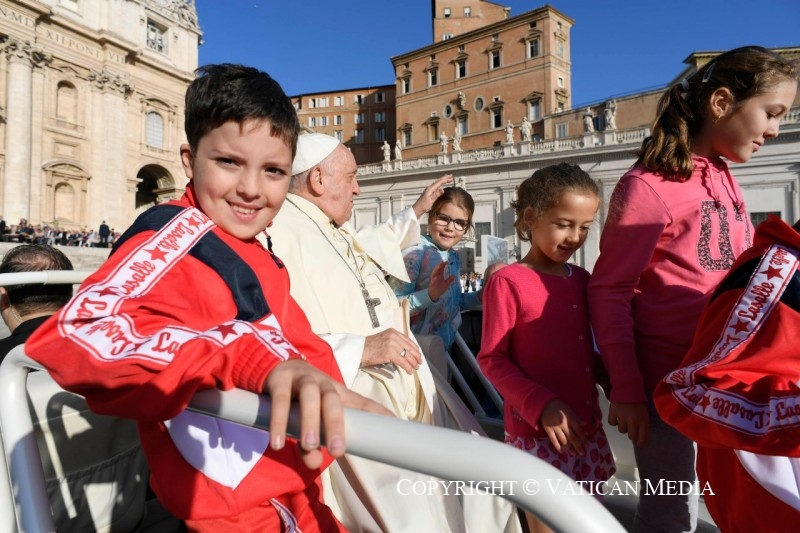
Catechesis. The passion for evangelization: the apostolic zeal of the believer. 22. Saint Josephine Bakhita: witness of the transforming power of Christ’s forgiveness
Dear brothers and sisters, good morning!
In our path of catechesis on apostolic zeal – we are reflecting on apostolic zeal – today we will let ourselves be inspired by the witness of Saint Josephine Bakhita, a Sudanese saint. Unfortunately, for months Sudan has been torn by a terrible armed conflict, of which little is spoken today; let us pray for the Sudanese people, so they might live in peace! But the fame of Saint Bakhita has exceeded every boundary and reached all those to whom identity and dignity is denied.
Born in Darfur – troubled Darfur! – in 1869, she was abducted from her family at the age of seven, and made a slave. Her abductors called her “Bakhita”, which means “fortunate”. She passed through eight masters – each one sold her on to the next. The physical and moral suffering she suffered as a child left her with no identity. She suffered cruelty and violence: on her body she bore more than a hundred scars. But she herself testified: “As a slave I never despaired, because I felt a mysterious force supporting me”.
In the face of this, I wonder: what is Saint Bakhita’s secret? We know that often a wounded person wounds in turn: the oppressed easily becomes an oppressor. Instead, the vocation of the oppressed is that of freeing themselves and their oppressors, becoming restorers of humanity. Only in the weakness of the oppressed can the force of God’s love, which frees both, be revealed. Saint Bakhita expresses this truth very well. One day her tutor gave her a small crucifix and she, who had never owned anything, conserved her treasure jealously. Looking at it, she experienced inner liberation, because she felt understood and loved and therefore capable of understanding and loving: this is the beginning. She felt understood, she felt loved, and as a consequence capable of understanding and loving others.Indeed, she went on to say: “God’s love has always accompanied me in a mysterious way… The Lord loved me: you have to love everyone … you have to have pity!”. This is Bakhita’s soul. Truly, to pity means both to suffer with the victims of the great inhumanity in the world, and also to pity those who commit errors and injustices, not justifying, but humanizing. This is the caress she teaches us: to humanize. When we enter the logic of fighting, of division between us, of bad feelings, one against the other, we lose our humanity. And very often we think we are in need of humanity, to be more humane. And this is. The work that Saint Bakhita teaches us: to humanize, to humanize ourselves and to humanize others.
Saint Bakhita, who became Christian, was transformed by the words of Christ she meditated on every day: “Father, forgive them; for they know not what they do” (Lk 23:34). And so she said: “If Judas had asked Jesus for forgiveness, he too would have found mercy”. We can say that St Bakhita’s life became an existential parable of forgiveness. How good it is to say to a person, “he was capable, she was capable of forgiving, always”. And she was always capable of forgiving; indeed, her life is an existential parable of forgiveness. To forgive because then we will be forgiven. Do not forget this: forgiveness, which is God’s caress to all of us.
Forgiveness liberated her. Forgiveness first received through God’s merciful love, and then the forgiveness given that made her a free, joyful woman, capable of loving.
Bakhita was able to experience service not as slavery, but as an expression of the free gift of self. And this is very important: made a servant involuntarily – she was sold as a slave – she then freely chose to become a servant, to bear on her shoulders the burdens of others.
Saint Josephine Bakhita, by her example, shows us the way to finally be free from our slavery and fears. She helps us to unmask our hypocrisies and selfishness, to overcome resentments and conflicts. And she encourages us, always.
Dear brothers and sisters, forgiveness takes away nothing but adds – what does forgiveness add? – dignity: forgives takes away nothing from you but adds dignity to the person, it makes us lift our gaze from ourselves towards others, to see them as fragile as we are, yet always brothers and sisters in the Lord. Brothers and sisters, forgiveness is the wellspring of a zeal that becomes mercy and calls us to a humble and joyful holiness, like that of Saint Bakhita.
Appeals of the Holy Father
I continue to follow what is happening in Israel and Palestine with tears and apprehension: many people killed, others injured. I pray for those families who have seen a feast day transformed into a day of mourning, and I ask that the hostages be released immediately. It is the right of those who are attacked to defend themselves, but I am very concerned about the total siege under which the Palestinians are living in Gaza, where there have also been many innocent victims. Terrorism and extremism do not help reach a solution to the conflict between Israelis and Palestinians, but fuel hatred, violence, revenge, and only cause each to other suffer. The Middle East does not need war, but peace, a peace built on dialogue and the courage of fraternity.
I address a special thought to the population of Afghanistan, suffering following the devastating earthquake that struck, claiming thousands of victims, including many women and children, and displaced persons. I invite all people of good will to help this people, already sorely tried, contributing in a spirit of fraternity to alleviating the sufferings of the people and supporting the necessary reconstruction.





